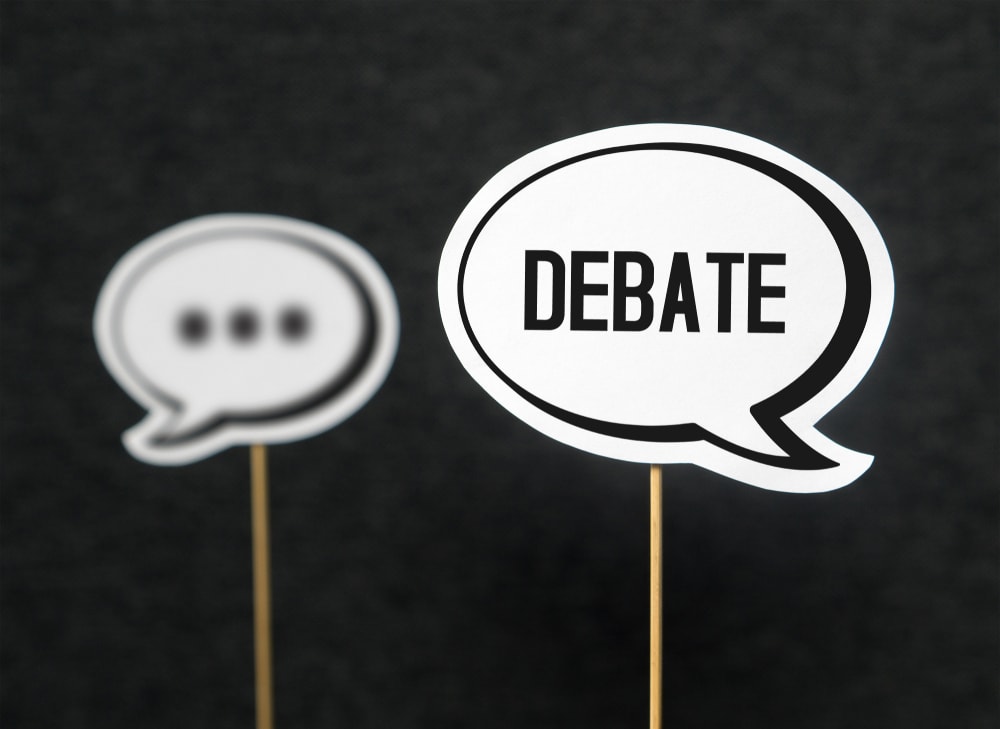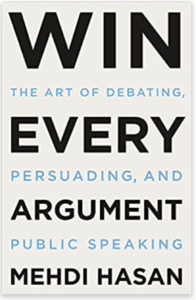
Book Review: Win Every Argument

British-American journalist Mehdi Hasan of MSNBC shows how to win arguments by taking the high road and/or the low road to victory. “There are very few things you cannot achieve when you have the skill and ability to change people’s minds,” Hasan writes.
Marketers will find lots of good ideas in this book about how to win by taking the high road with your message. You’ll also find low-road tactics we’d advise you to avoid. There’s no need for brands to take the low road.
Here’s a summary of Win Every Argument:
Win over your audience
When you debate, make sure you learn everything you can about your audience. This is a great approach for marketers.
By knowing who your audience is, you can:
- Modify the language you use to make your case.
- Tailor your argument to fit the audience’s interests or identities.
- Make appeals that tap into the audience’s beliefs.
- Heap praise on the audience that reflects your familiarity with them and how they see themselves.
“An audience is never wrong,” as filmmaker Billy Wilder said.
Focus on feelings, not just facts
“Our feelings rarely care about the facts,” Hasan writes. “To move people to your side … make them care by appealing to their hearts, not just their heads.”
Harking back to Socrates and Plato, he notes three ways to win an argument:
- Ethos is an appeal based on character, credibility, and reputation
- Logos is a logical appeal
- Pathos is an emotional appeal.
Pathos beats logos almost every time since humans are feeling machines that think. “The heart steers the head,” Hasan writes.
Show your emotions to share them with your audience. Feelings help you get facts across to your audience, and they help listeners retain those facts.
When you tell stories, you align the brains of your audience with your own thoughts. “[A] story is up to 22 times more memorable than facts alone,” says Jennifer Aaker, a marketing professor at Stanford University.
For example, in nonprofit fundraising, one emotionally powerful story about a single person outperforms data-packed stories about millions of people.
Be willing to call out your opponent, Hasan advises. “Call a lie a lie. Declare the truth.” To be convincing, you need to believe it yourself.
“A compelling story, even if factually inaccurate, can be more emotionally compelling than a dry recitation of the truth,” notes political consultant Frank Luntz.
To be clear, we advocate always telling the truth. Truth is ethical (a word derived from ethos). And telling the truth gives you less to remember.

Show real, solid proof
In this age of “Truth Decay,” expect full-scale assaults on truth, reason, and reality.
Gather damning factual evidence and have it in hand to deploy against your opponent in real-time. Do deep research to get hold of the facts, figures, and quotes that back you up.
In a debate, listen closely to your opponent’s inconsistencies so you can highlight them. Quote opponents in their exact words … without identifying them as their words, at first. Then reveal to the audience who made that statement, exactly when and where.
Personal attacks demolish opponents
In high school debates and college logic classes, you were probably taught that attacking your opponent is wrong, and that ad hominem attacks are unethical. Forget that.
“If ad hominem attacks are illegitimate, how come they’re so useful?” asks writer and philosopher Tom Whyman.
“Play the ball and the man,” Hasan advises. He notes Donald J. Trump’s success in taunting, diminishing, and nicknaming opponents, which sufficed to get him elected.
The takeaway? Challenge your opponent’s character, credentials, and claims. This is a high-risk, high-reward strategy — one that most brands should avoid taking.
Since pro hominem arguments appeal to authority, ad hominem attacks are a necessary and proper response, Hasan argues. Three useful types of ad hominem attacks are:
- Using verbal abuse and name-calling
- Revealing opponents’ hidden conflicts of interest
- Pointing out the hypocrisy when words and actions don’t align.
Ask opponents tough questions such as: When exactly did you know about this issue? When did you become an expert on this topic? What actual qualifications do you have to pass judgment on this topic?
Listen closely to speak well
Winning debates requires you to listen well so you speak well. Keep an open mind, listening for valid points and clever lines. Pay attention to whoever has the microphone at this moment. Take notes in longhand so you can process information better.
Be fully present in the moment, not distracted by a cell phone. Make eye contact with the moderator, opponent, and audience to show you care. “Real people connect with you and become more open to your ideas if they feel listened to,” Hasan says.
Make your audience laugh
One of the best ways to win an argument is to get the audience to laugh at your opponent.
Laughter works. Be self-deprecating and spontaneous. Act out humor with props and facial expressions.
Careful: Don’t be offensive or wooden. Never go over the top with your humor.
For the audience, humor improves memory and cognition, increases attention and engagement, and brings the audience together with “social glue.”
“If you want to tell people the truth, make them laugh, otherwise they’ll kill you,” Oscar Wilde said.
Defeat your opponents’ seriousness with laughter, and their laughter with seriousness.
Make magic with threes
Make three points, tell three stories, or share three examples. Why?
Because audiences find it easy to remember three chunks of information at once. Three points help people recognize a pattern, a job that human brains love to do.
Use the magic of threes. It’s why we advocate scaling up your Message Map from 7 seconds to 2 minutes to 20 minutes by using a repeated pattern of three (known as a fractal).
Use judo moves against opponents
During a debate, be flexible and yielding. Use the energy from your opponent’s punch to flip them or incapacitate them. For example:
- If your opponent makes a fair point, concede: “Here’s where he’s right. But here’s where he’s wrong.”
- Pre-empt your opponent by asking to go first on a panel.
- Reframe the question that’s presented, to reset the terms of the debate.
Zing ’em to win
Zingers often determine who wins a political debate. Perhaps you recall Lloyd Bentsen’s retort to Dan Quayle in the 1988 vice-presidential debate, “Senator, I served with Jack Kennedy. I knew Jack Kennedy. Jack Kennedy was a friend of mine. Senator, you are no Jack Kennedy.”
As George W. Bush said, “Unless there is the zinger or the kind of cute line or … the quotable moment, there’s no victor.”
Trap opponents with their own words, with a contradiction, or with a question.
Watch out for the Gish Gallop
What to do when your opponent makes so many arguments in a short time, that there’s just not enough time to refute each one? This technique aims to “bury adversaries in a torrent of incorrect, irrelevant or idiotic arguments,” Hasan writes.
In debating circles, it’s called the Gish Gallop, defined by the Urban Dictionary as “spewing so much bullshit in such a short span that your opponent can’t address let alone counter all of it.” Afterward, your opponent claims victory when you’re unable to refute each and every claim.
To counter the Gish Gallop, pick your battle: choose your opponent’s weakest argument and demolish it. “Call bullshit on the bullshitter.”
Before your time runs out, remind the audience that this play comes straight out of the Kremlin’s propaganda playbook. We don’t recommend that brands adopt the Kremlin propaganda playbook.
There’s much, much more to learn about persuasion, debating, and winning arguments in Win Every Argument.
Pick up the book, to help you win your next argument.





